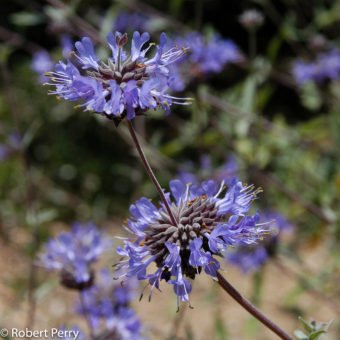
Allen Chickering sage
Plant Type: Shrub, Native
Water Needs: Low 1
Exposure: All day sun
Height: 3 ft. - 5 ft. Width: 8 ft. - 12+ ft. can be kept to appx. 8' with annual pruning
Below is a list of our favorite low-water California native plants for use in commercial, municipal, and institutional-scale landscapes, plus a few horticulturally compatible non-native selections which can be used alongside the native species.
On most sites, the plants on this list, once established will thrive with a deep watering every three to four weeks in Southern California, even in inland areas, and even in the summer, as long as they are selected appropriately for the site. Watered on this schedule they would receive approximately 66-84% less water than cool season turf grass over a typical year in inland Southern California areas.
The plants on this can thrive in inland valley, inland foothill, and coastal-influenced conditions, with the exception of desert willow and Pink Dawn chitalpa, which both perform most consistently with the heat of inland sites. Some of the plants on this list will also grow well in lower mountain elevations above the snow line or in true desert conditions, but not all of them. If your site is in the mountains or true desert be sure to check local references for plant suitability.
The non-native species on the list were selected for specific attributes and either contribute a sculptural visual effect and/or are highly-reliable flowering species for use in small spaces and along walkways, especially in areas with harsh reflected heat. Many California native perennials tend to be short-lived on many commercial sites, so including these non-natives provides additional reliable design options for landscapes featuring native plants but not fully focused on only having native species.
In most cases, commercial landscapes are best set up to be successful and maintainable by specifying a relatively limited selection of easier-to-grow and unfussy waterwise plants.
We encourage considering using California native species as a way of achieving maximum water savings AND the greatest number of additional benefits, including habitat for native pollinators, butterflies, and songbirds as well as potential year-round blooms. This approach potentially enhances the value of the landscape for property owners and stakeholders.
While these plants are all easy to grow, their proper irrigation and pruning is different than the average commercial landscape. It is critically important for maintenance teams to understand the seasonal pruning requirements of each species (when and how hard to cut back plants) and irrigation management for native landscapes. None of this is difficult, but the basics must be learned to achieve both plant performance and water savings.
A publication with California native landscape design, irrigation, and maintenance recommendations for commercial, institutional, and municipal sites is available here.
Chino Basin Water Conservation District provides FREE training in native plant maintenance and irrigation management for landscape professionals who work in the western San Bernardino County area. These trainings are also available to students enrolled in horticulture or landscape architecture programs. Learn more about the California Native Plant Landscaper Certificate program here. Landscape professionals who work in other areas can learn more about opportunities to take this course through the Theodore Payne Foundation here.